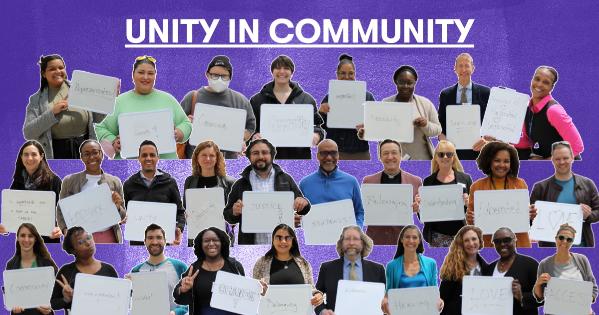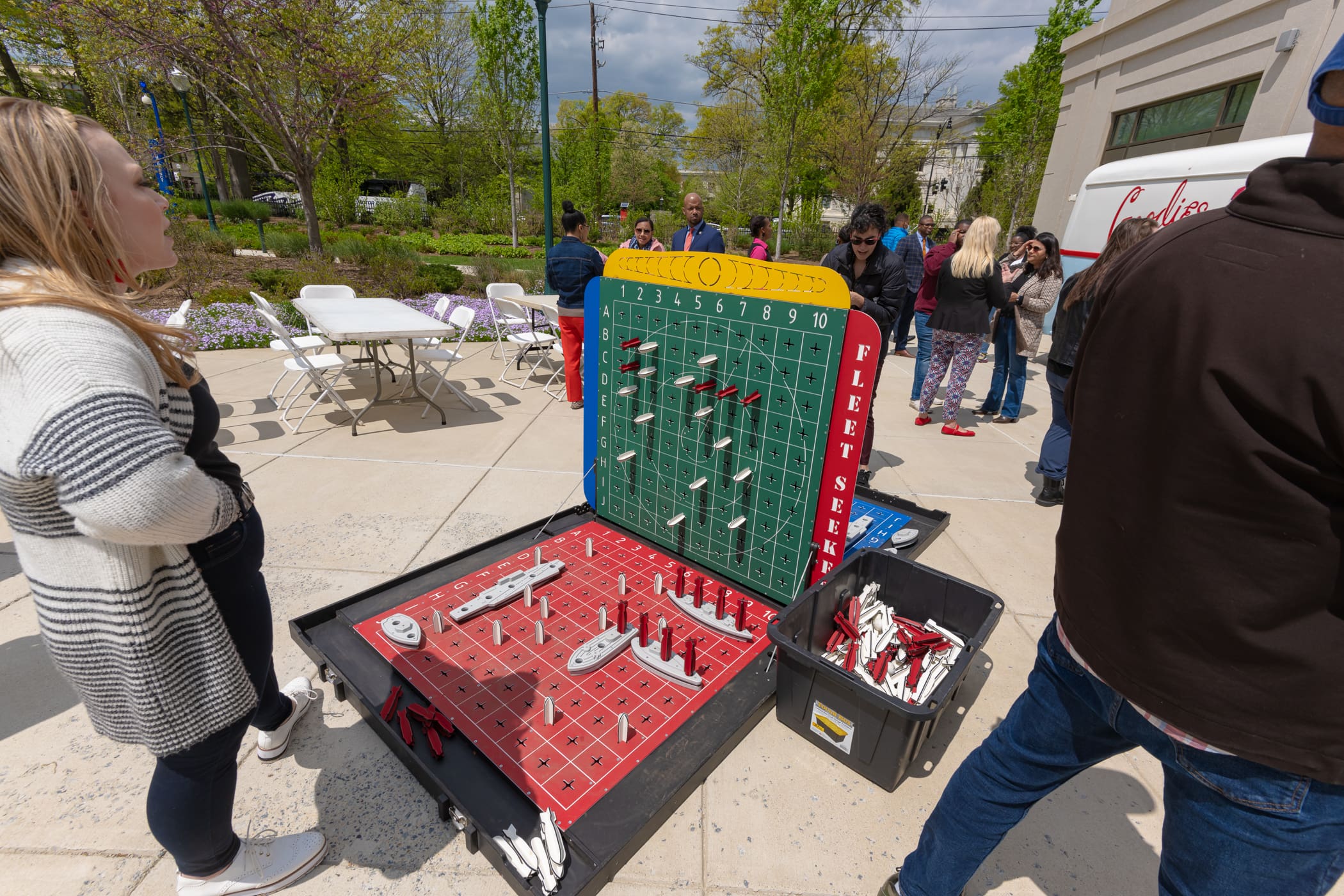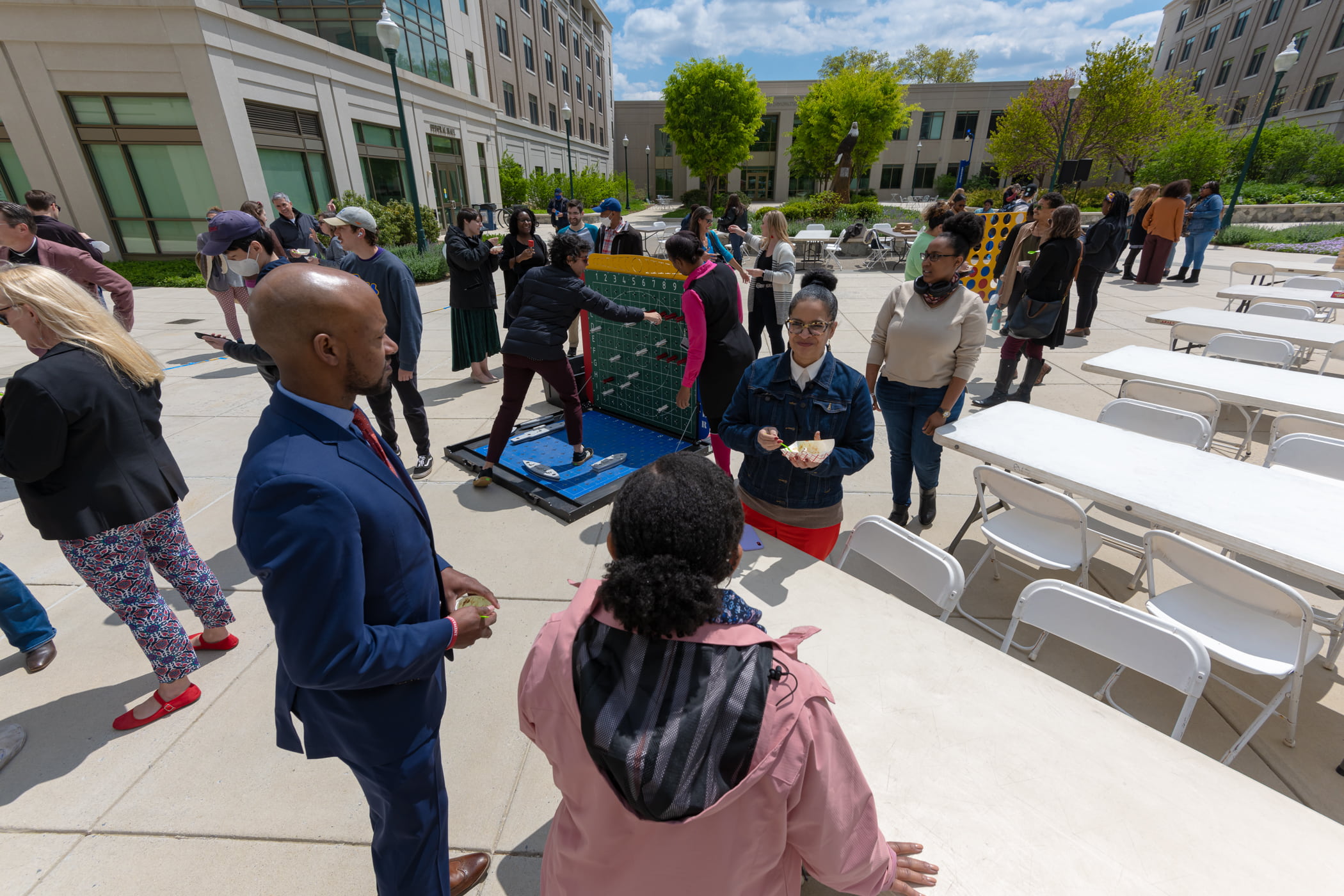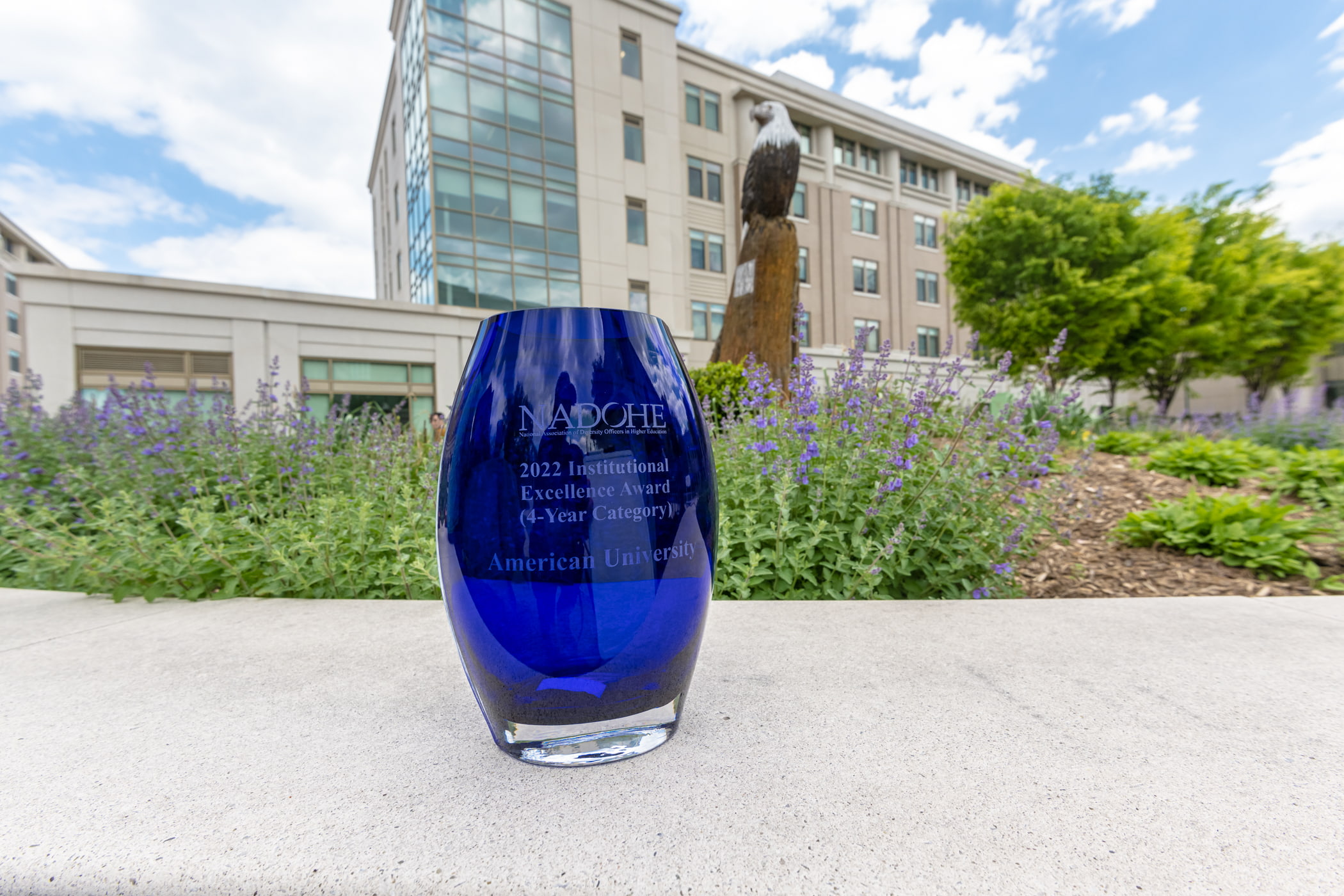AU Marks a Milestone on Journey to Inclusive Excellence

It’s an effort that’s taken the hard work of the whole community, and it’s just getting started. But AU’s commitment to advancing equity and inclusion has earned the university a national award, and that was a reason to celebrate.
At the end of the semester, campus faculty and staff partners came together on the East Quad for Unity in Community, a celebration of progress and shared commitment. Hosted by the President’s Council on Diversity and Inclusion (PCDI), the event was a chance to gather over food, music, and games to celebrate the impact of AU’s inclusive excellence work and gear up for the next chapter ahead.

Four Years of Work and Progress
The AU community’s efforts to improve students' sense of belonging and address structural inequities was recognized this year with a high honor – the 2022 Inclusive Excellence Award from the National Association of Diversity Officers in Higher Education (NADOHE). As a leading voice for diversity officers, NADOHE recognizes institutions for promoting and sustaining innovative diversity, equity, and inclusion efforts in their campus community.
"It is truly an honor to have our AU community recognized in this way," said Amanda Taylor, Assistant Vice President for Diversity, Equity, and Inclusion. "While we still have much work ahead of us, the NADOHE award reminds us we are headed in the right direction and inspires us to continue forward."
This award reflects the progress led by many AU campus partners to implement institutional efforts to enhance diversity, inclusion, equity, and access, guided by AU’s Inclusive Excellence (IE) Plan. Launched in 2018, the IE Plan is a five-year strategic plan that outlines comprehensive and sustainable campus-wide change efforts.
Now at the end of its fourth year, the IE plan continues to clarify accountabilities, identify metrics, and sharpen an intersectional focus on racial equity work. The NADOHE award recognizes the substantial progress made by numerous AU initiatives to advance institutional transformation at AU in the areas of leadership diversity, student sense of belonging, and enhanced curricular offerings.
Diversifying Senior Leadership
AU has made significant progress towards its goals of diversifying senior leadership. In 2017, 17 percent of the President’s Council identified as Black or African-American, Hispanic or Latino, or Asian-American or Pacific Islander (AAPI). in 2021, this rose to over 40 percent. The Council has continued to maintain high levels of woman-identified leaders, with 63 percent in 2017 and 64 percent in 2021. This effort has been supported by AU's focus on training search committees to use equitable hiring practices to recruit more diverse leaders, faculty, and staff.
In support of these goals, HR has developed and implemented an inclusive hiring training series and associated toolkit, which aim to aid search committees in maintaining equitable practices throughout the hiring process. Though not magic bullet solutions, the trainings and toolkit are designed to help those making hiring decisions understand the best hiring practices for implementing an equitable search, including by recognizing the impact of unconscious bias at many stages of the process.
"It’s definitely important for communities to see themselves represented on campus, and we can’t do that with processes that aren’t equitable," Jennifer Scott, AU’s Director of Recruiting, noted at the start of this academic year. "But it’s also important that we have diversity within the leadership teams on campus, and that’s an iceberg we’re trying to crack at."

Recognizing Inclusion Work through Tenure and Promotion
Hiring is only the start. Among the important steps it takes to nurture a culture of inclusion is recognizing and acknowledging administrators, faculty, and staff for their efforts to build inclusive climates and advance equitable outcomes for all.
The NADOHE award noted one key step the university has recently undertaken to encourage academic departments to update the faculty tenure and promotion guidelines to recognize and reward the often-hidden labor undertaken to support diversity and inclusion in teaching, service, and scholarship.
Building Inclusive University Systems
What is your name? What does it say about you? One of the key IE plan initiatives to help build sense of belonging among student on campus includes the development of a Name and Gender Identity Policy and new technology system. With this new system, students can now enter their preferred name and pronouns across relevant university systems if they choose. This will ensure students’ names are listed on class rosters and email addresses in a way that fully expresses who they are.
"The Name and Gender Identity Policy and technology work at AU matters so much because creating an environment where everyone is welcomed in an affirming way is crucial to showing each member of our campus community that that they belong and that we see them for who they are," said Anna Morrison, Assistant Director of Education and Support Programs for LGBTQIA+ for the Center for Diversity and Inclusion (CDI).
"Eliminating barriers for students to be known by their chosen names means that no matter who the student is or why they use a chosen name, they can focus on thriving as a student, rather than worrying about being named incorrectly."

Centering Diverse Voices in an Expanded Curriculum
Over the past four years, AU has expanded efforts to ensure that the university’s commitment to inclusive excellence is reflected throughout the curriculum. The AUx2 course for all first-year students aims to help students begin to understand structural inequality, and the Diversity and Equity (DIV) core courses that follow are offered across 60 majors to explore discipline- or field-specific questions of power, privilege, and inequity. This year, faculty from across the institution redesigned or created new programs and courses that focus on antiracist principles and explore diverse voices, histories, and experiences. New programs such as the Latina/o/x Studies minor and the undergraduate certificate in Disability, Health, and Bodies also allow students to explore often underrepresented perspectives from an interdisciplinary perspective.
Programs like the Latina/o/x Studies minor offer students the chance to gain a more rigorous education by learning from the rich array of perspectives from scholars of color and those from other marginalized identities whose critical voices are often left out of the traditional curriculum. "Black and brown people have been thinking, writing, and creating works of art that resist racism and marginalization since before the United States existed," David J. Vázquez, Associate Professor of Literature, noted when the program was launched. Courses like the ones in the new minor, he added, "focus on Latina/o/xs, with an eye toward how they create literature, films, and visual art…in order to understand how Latina/oxs document our historical presences and contest the ways we have been exploited and marginalized."

The Journey Continues
Though the NADOHE award marks a key milestone on AU’s inclusive excellence journey, meaningful change will take ongoing time and effort.
At the close of the Unity in Community event, Fanta Aw, Vice President of Undergraduate Enrollment, Campus Life, and Inclusive Excellence, thanked the AU campus partners for all of the work that culminated in the NADOHE award, and also commented on the importance of continuing to redouble both our institutional and individual commitment to the work ahead.
"On an everyday basis," Aw pointed out, "it is not only about showing up. It’s about the intentionality and persistence around this work that allows us to continue to make slow but steady progress. My message to everyone is simply thank you, and looking forward to the next steps on our journey."

